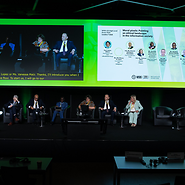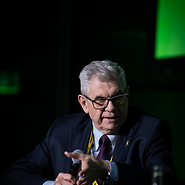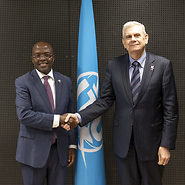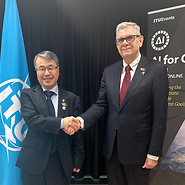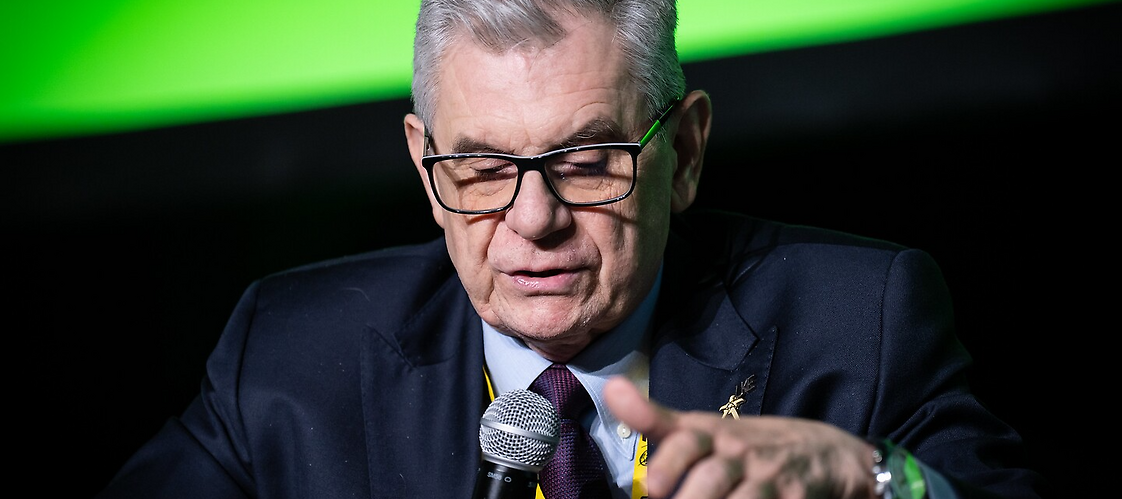
President of UKE at the WSIS+20 High-Level Event 2025
15 July 2025
From July 7-11, an international event, the WSIS+20 High-Level Event 2025, took place in Geneva, organized annually by the International Telecommunication Union (ITU) and the United Nations Educational, Scientific and Cultural Organization (UNESCO), the United Nations Development Programme (UNDP), and the United Nations Conference on Trade and Development (UNCTAD), in collaboration with over 50 other UN agencies. A total of 11,000 participants from 160 countries attended the conference and the concurrently held Artificial Intelligence Forum. The event also attracted thousands of online participants. This year, discussions and panels primarily focused on the future use of technology for the benefit of all users, ensuring that no one is excluded during the rapid development of communication technologies and Artificial Intelligence.
The President of UKE participated in many important discussions: about the future of regulation, Artificial Intelligence, and the development of standardization. He also took part in roundtable discussions and panels of leaders, of which there were 13 during the five days of the event.
UKE President Jacek Oko led a leaders' panel on digital skills titled "Filling the Digital Skills Gap: Reskilling and Upskilling Strategies in a Changing World." The discussion was opened by a speech from Mr. Cosmas Zavazava, Director of the ITU Telecommunication Development Bureau. The panel also included:
• Ms. Celeste Drake, Deputy Director-General of the International Labour Organization based in Switzerland,
• Ms. Ekaterine Imedadze, Commissioner of the Georgian National Communications Commission,
• Ms. Anna Sophie Herken, Board Member of the German Society for International Cooperation from Germany,
• Prof. Himanshu Rai, Director of the Indian Institute of Management from India,
• Ms. Gillian Hinde, Global Leader of Corporate Responsibility at Ernst & Young,
• Mr. Michele Cervone d'Urso, Ambassador of the European Union to the United Nations,• Mr. Hubert Vargas-Picado, Deputy Minister, Ministry of Science, Innovation, Technology, and Telecommunications from Costa Rica.
The panelists presented their achievements and opinions on key strategies responding to emerging digital needs in the job market. Among other things, discussions were held on:
• solutions that governments should implement to address the needs for digital skills,
• digital skills that are essential for successful digital transformation,
• the development of digital skills for all social and age groups, including people with special needs.
The next day of the sessions. The President of UKE was a speaker in the leader panel "Moral Pixels: Painting the Ethical Landscape in the Information Society." The discussion also included:
• Ms. Vanessa Matz, Minister of Modernization of Public Administration, responsible for public enterprises, management of state assets, digitization, and policy, Belgian Federal Government,
• Dr. Belete Getahun, Minister, Ministry of Innovation and Technology of Ethiopia,
• Mr. Abdulbaset Albaour, Minister, General Authority for Communication and Information Technology of Libya,
• Mr. Ernesto Rodríguez Hernández, First Deputy Minister, Minister of Communications of the Republic of Cuba
• Prof. Salma Abbasi, Founder and President, eWorldwide Group.
The President of UKE referred during the discussion to the dangers posed by AI and the possibilities of using this technology in education. He presented two sides of AI - one is caution and the protection of universal ethical values against the flood of false content, while the other side is utilizing AI for the further development of society. President Jacek Oko emphasized that the key to building social resilience is education. Education that allows every citizen, from children to seniors, to distinguish manipulated content from genuine ones, as well as to understand the intentions behind them - whether they were generated in good faith or bad faith. President Oko said during the panel: 'Let us not be afraid of AI, on the contrary - let us use it as a powerful tool in the educational mission. Let us treat it as a personalized assistant in learning, aimed at individuals with special needs, intellectual disabilities, those on the autism spectrum, or seniors, for whom traditional methods can be a barrier.'
At the end of his statement, the President of UKE emphasized that: Our primary goal is to create a safe internet. And a safe internet in the age of AI means much more than just being fast and reliable. It means an internet free from manipulation, which once again becomes what it was meant to be at its inception - a credible and proven source of knowledge. Therefore, let us use AI to teach about AI.
The President of UKE held many bilateral meetings with the Management of ITU during the event.
• Mr. Thomas Lamanuska, Deputy Secretary-General of ITU,
• Mr. Cosmas Zavazava, Director of the ITU Development Bureau,
• Mr. Seizo Onoe, Director of the Telecommunication Standardization Bureau,
• Ms. Diana Tomimura, Deputy Director of the ITU Radiocommunication Bureau.
During the talks, the implemented ITU projects in which UKE experts are involved were discussed, as well as the current and future cooperation between UKE and ITU. The President of UKE, along with representatives from the Ministry of Digital Affairs, also met with Mr. Syahrilazlim Mahammad, Director of Corporate and International Affairs at the Malaysian Communications and Multimedia Commission. The discussions covered the state of development of electronic communication markets in Malaysia and Poland, key projects related to digital skills in these countries. Plans for both countries to run for the ITU Council and future cooperation regarding the exchange of experiences related to the Malaysian interests in the mObywatel and PIIT projects were also discussed.
The presence of leaders from around the world, intensive discussions about ethics, education, and regulations, as well as bilateral meetings with key partners, demonstrate that this event was one of the most important international forums in the field of digitization and the development of the information society.







